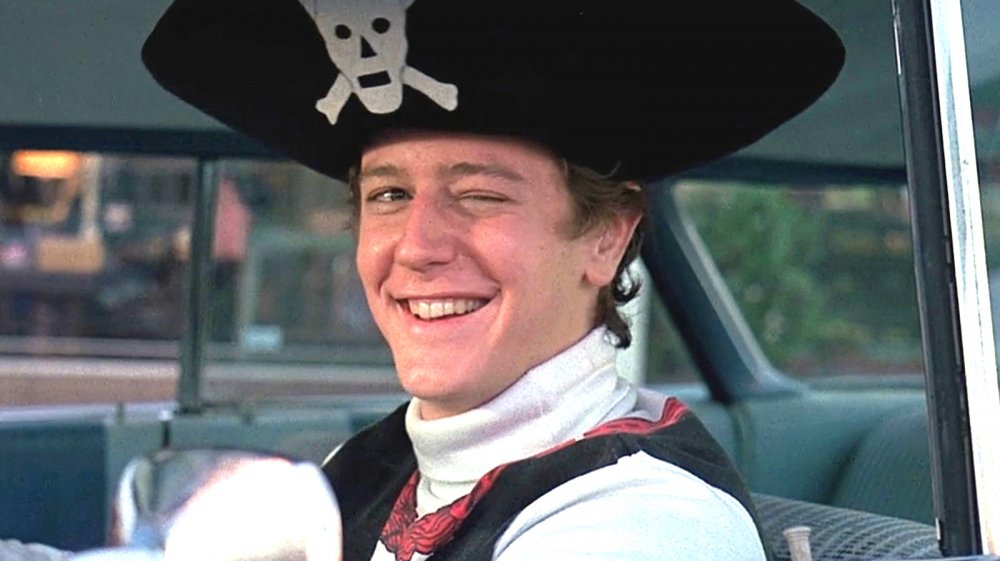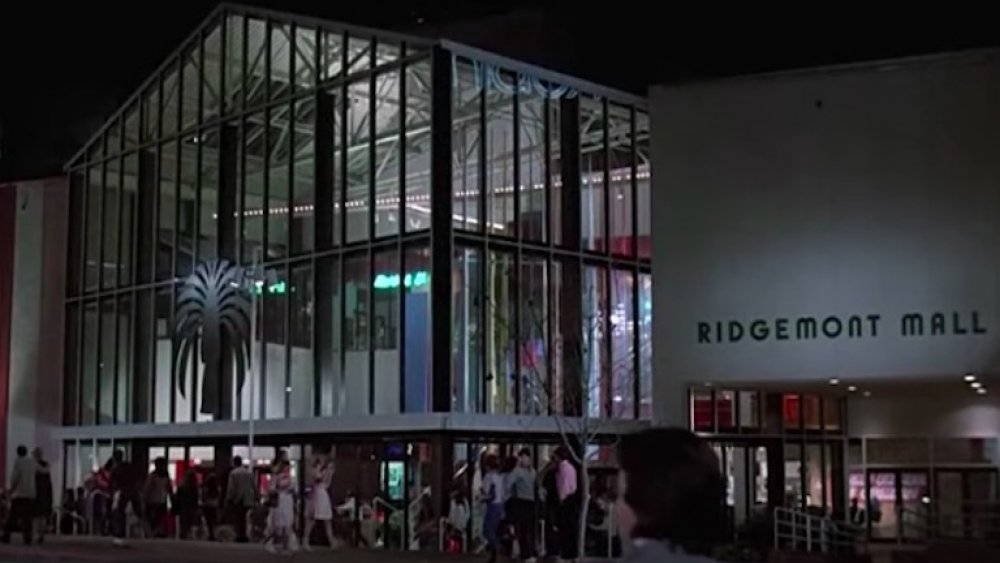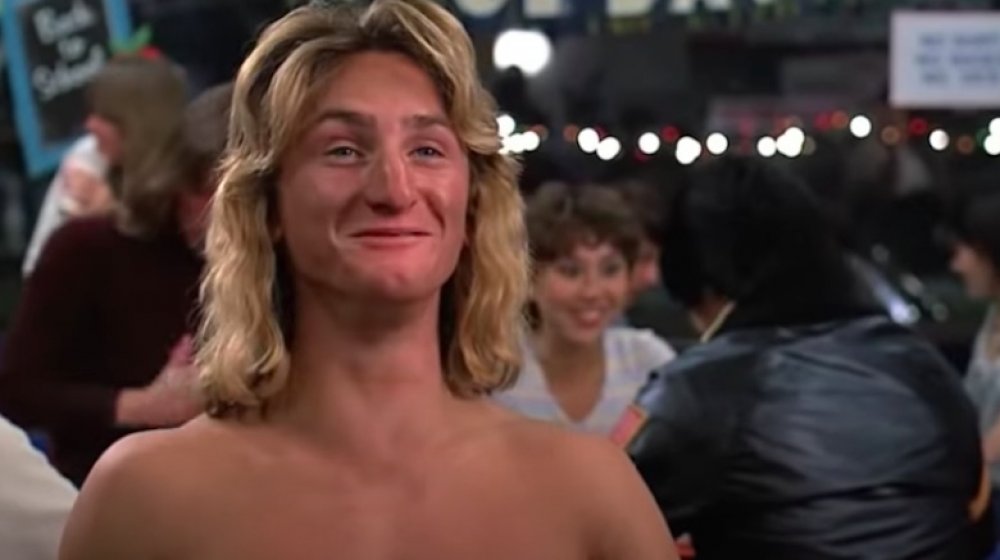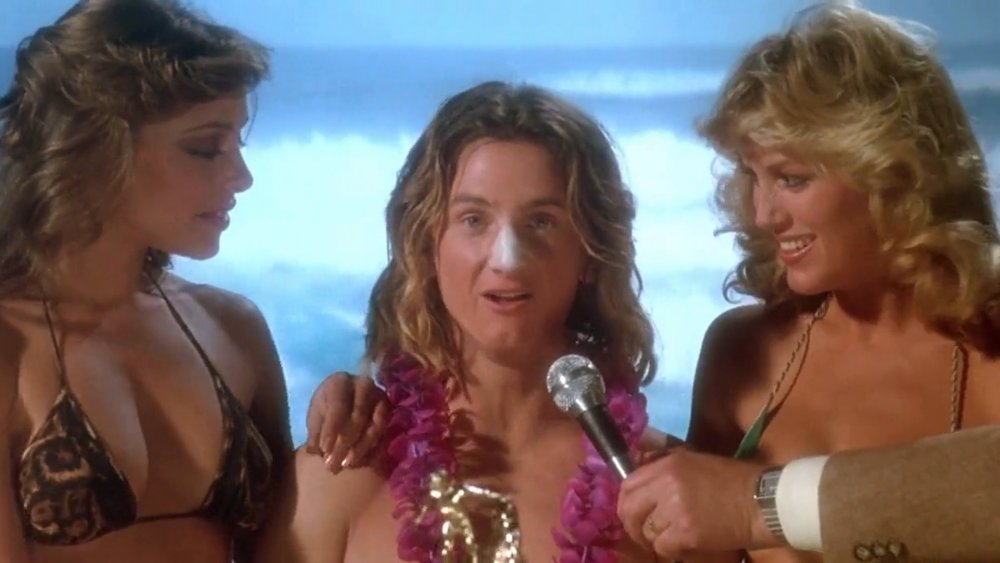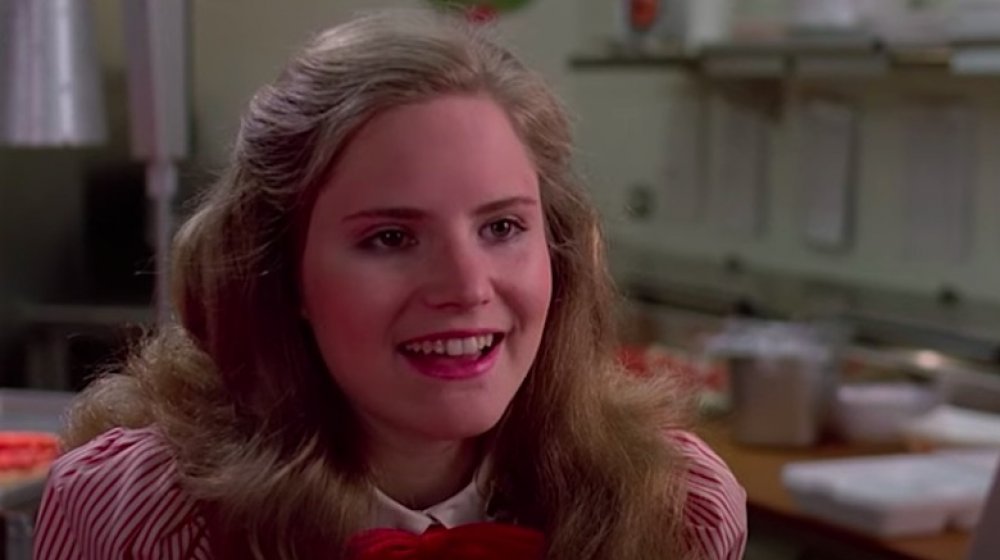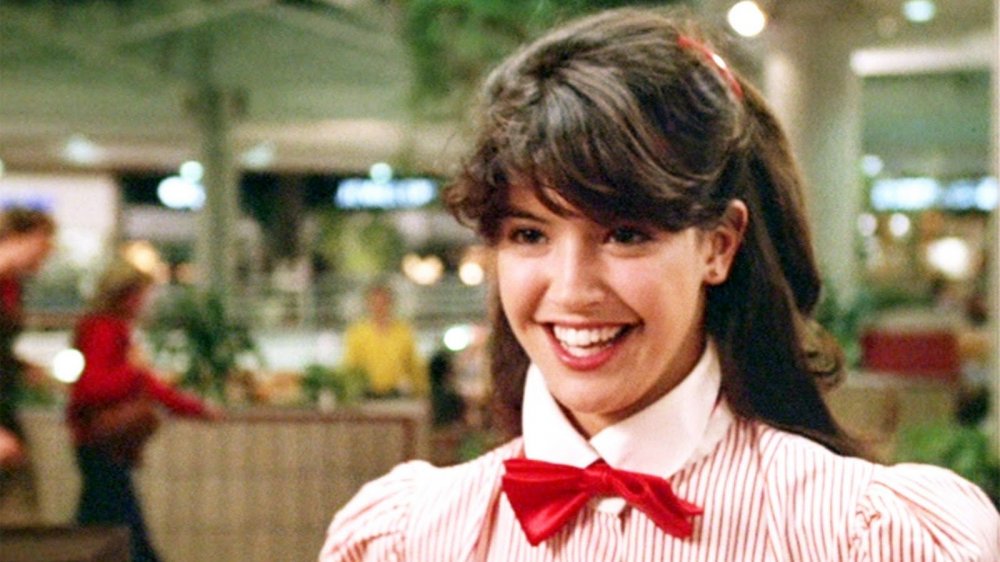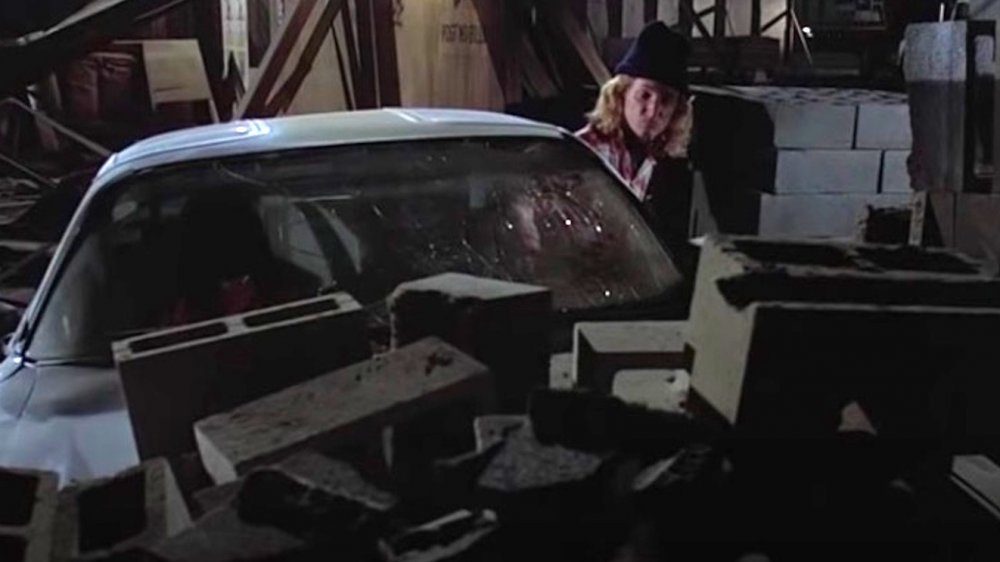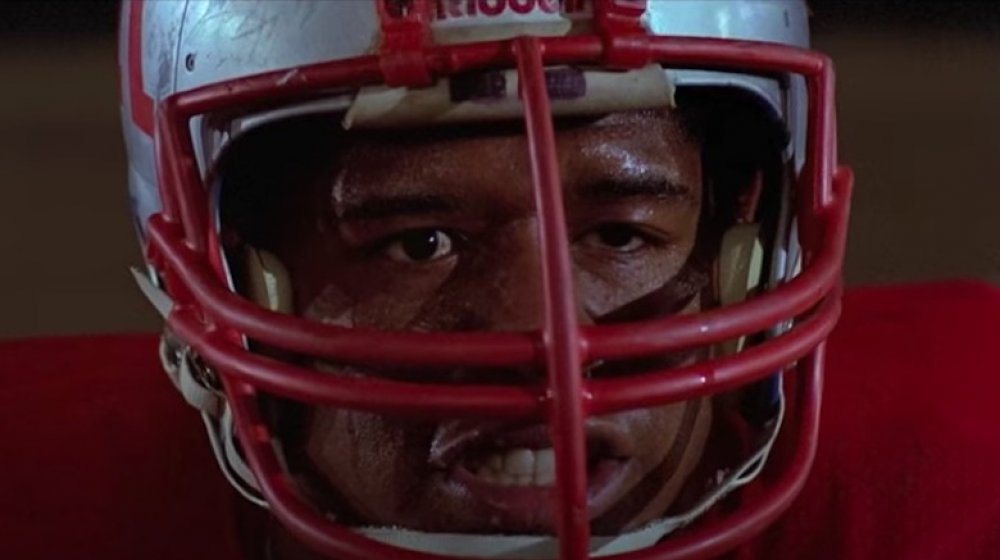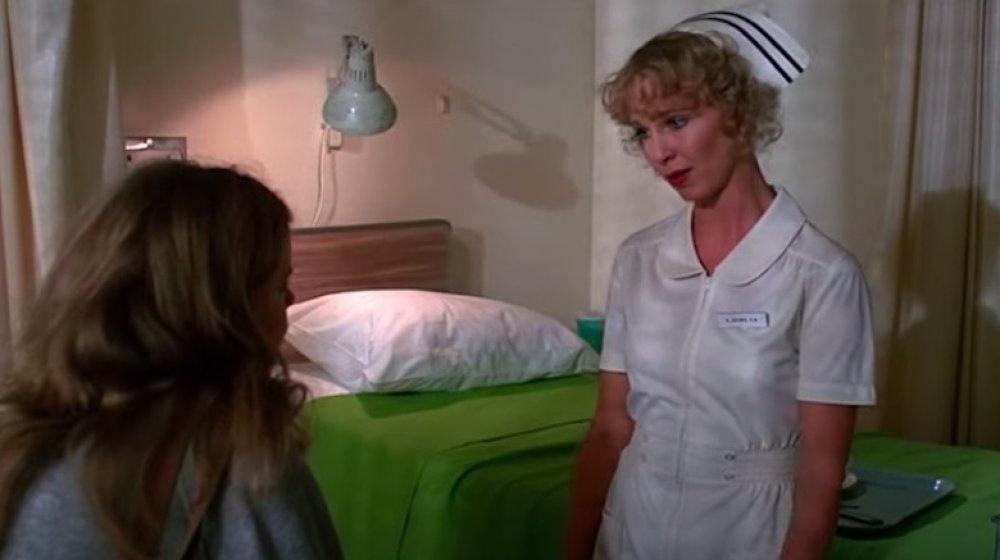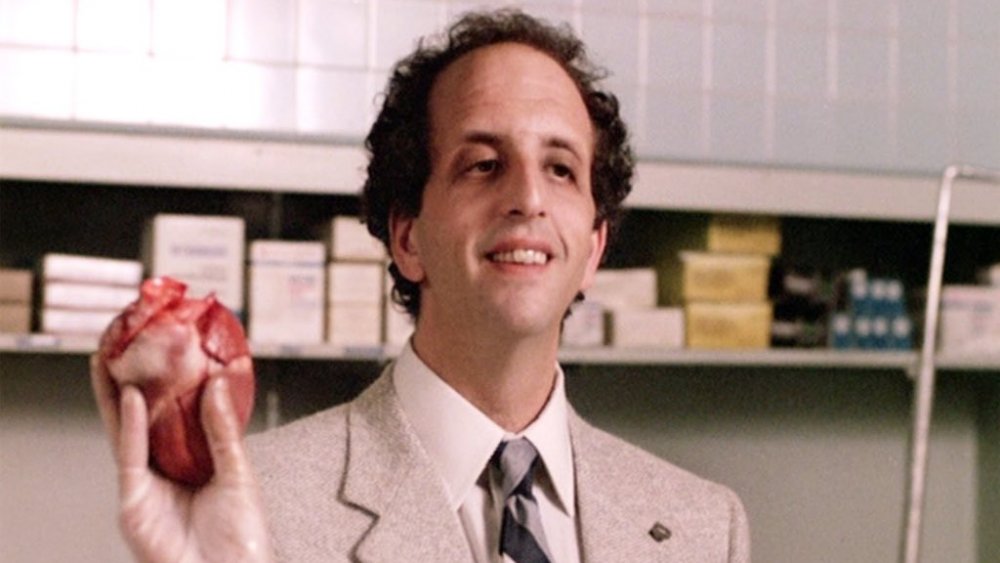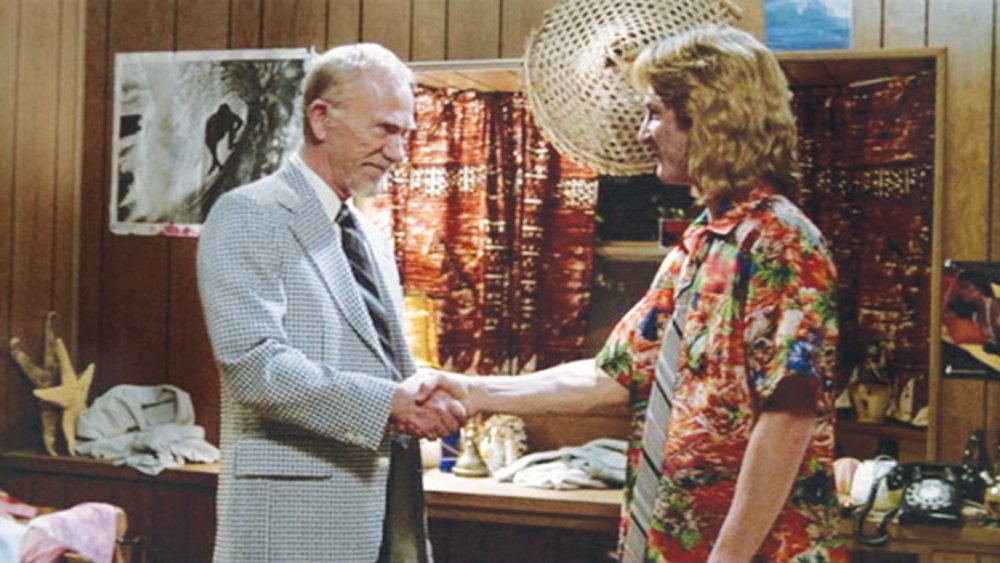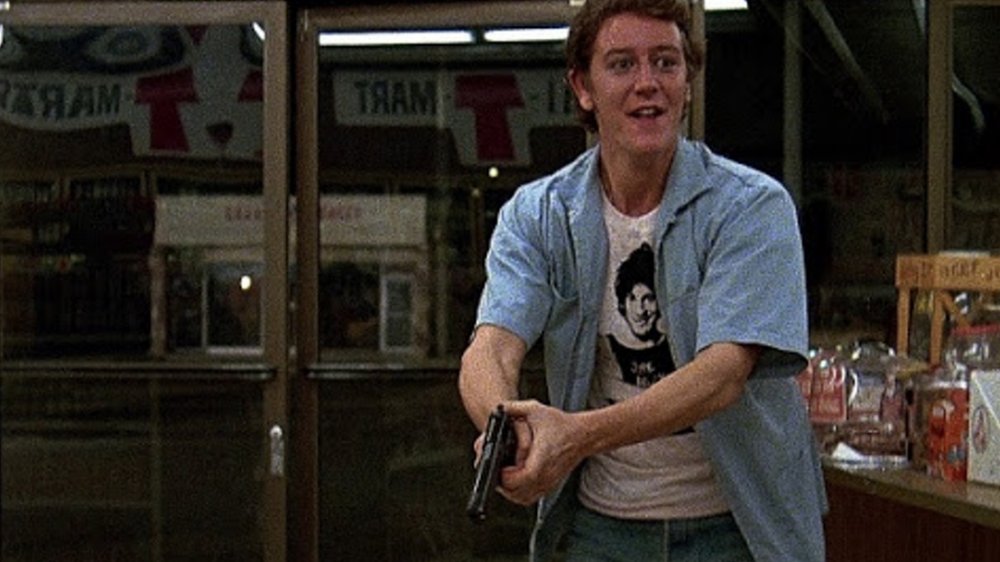Things You Forgot Happened In Fast Times At Ridgemont High
A classic coming-of-age film from the early '80s, Fast Times at Ridgemont High chronicles the lives of a group of teenagers during an academic year at the titular school. It marked the directorial debut of Amy Heckerling, who then went on to direct a number of other popular films — including another ultra-popular coming-of-age comedy, Clueless. The screenplay was written by future superstar writer-director Cameron Crowe, based on his own nonfiction book of the same name. Prior to writing his book, Crowe, then a 22-year-old, famously went undercover at Clairemont High School in San Diego to observe and document the lives of teens firsthand.
Brought to life by a stellar ensemble cast, the plot follows multiple storylines, from freshman Stacy looking to gain romantic experience with the help of her older friend Linda to the school stoner, Jeff Spicoli, facing off against his strict history teacher Mr. Hand. With so many moving parts to the world of Ridgemont High, it can be easy to forget some of the details of this cult classic even if you haven't been spending too much time in Spicoli's van. Here's a rundown of some of the things you may have forgotten happened during Fast Times at Ridgemont High.
The very '80s opening montage
With "We Got the Beat" by the Go-Go's playing, the first shot of the film introduces viewers to the Ridgemont Mall, where some of the film's action takes place. The subsequent opening montage includes various shots throughout the mall that absolutely scream "The Eighties." Malls were hitting their stride during the decade, becoming a popular hangout spot for many teenagers, which is exactly what the opening of Fast Times indicates. We see all the major characters in and around the mall, many of whom are at their part-time jobs — Stacy and Linda at the pizza parlor, Mark at the movie theater, Brad at the All-American Burger. There are also glimpses into the record store, the arcade, and the common areas — the teens are everywhere, cementing the idea that the mall was a major social hub. The setting is complemented by '80s fashion, defined by the bold colors and permed hair that show up abundantly in the opening shots. One moment shows two women in headbands both grabbing at the same pair of bright pink spandex workout pants.
When the film premiered in 1982, every piece of this montage likely felt familiar to the average moviegoer. To a viewer watching the film in the present day, it also feels familiar — but for anyone who didn't live through it, it's only familiar because of the various media that has depicted this era.
No shirt, no shoes, no problem
One of the most memorable elements of the film is a young Sean Penn, who plays the perpetually stoned Jeff Spicoli. The only one of the main cast to appear on the official poster, he has more or less become the face of the film. What viewers may not remember about his portrayal, however, is his lack of a shirt for multiple scenes.
Five minutes into the film, Jeff walks into All-American Burger with a couple of his friends. The three of them proceed to take their shirts off before sitting down. Another character, Brad, who works at the restaurant, comes over to point out a sign on the wall that says, "No shirt, no shoes, no dice." A couple other early scenes follow with Penn sans shirt, including a classroom scene and, more fittingly, a dream sequence in which he wins a surfing competition. Whether Spicoli's propensity for public toplessness is a reference to his surfing hobby or just another indication that he's out of it all the time, it's a hilarious detail.
Some of the humor really hasn't aged well
Times change, and so do public perceptions regarding what constitutes acceptable humor. For modern viewers, it can often come as a shock when older films casually dispense with jokes that would be deemed offensive today, and although it has a number of surprisingly smart and sensitive things to say about the teenage American experience of its era, Fast Times at Ridgemont High is definitely no exception.
Toward the beginning of the film, in the first scene at the high school, we see a few shots of random kids around the campus. They're messing around the way kids in school-set comedies do — some are throwing toilet paper onto the building, one kid is taking a hat off of a fellow student's head, and another one pulls the old move of secretly sticking a sign on someone else's back. In this case, the sign sports a homophobic slur. It's a fleeting shot, but a noticeable one.
Later, Spicoli dreams about winning a surfing competition, after which an interviewer says his victory is a surprise, noting that some people expected "Mark 'Cutback' Davis or Bob 'Jungle Vet' Gerard" to win. To this, Jeff laughs and offers another homophobic slur. The women standing next to Jeff laugh along — as does the interviewer, who responds, "That's fantastic."
The sex scenes are murky when it comes to consent
At the start of the film, Stacy is a 15-year-old virgin looking to gain dating and sexual experience. When a 26-year-old customer named Ron shows up at the mall restaurant where she works and asks her how old she is, Stacy tells him she's 19, and he asks her out. On their date, he takes her to "The Point," the dugout of a baseball field where teens go to hook up. Already, the fact that 26-year-old Ron is taking Stacy to an empty dugout, rather than on an actual date in a public place, is extremely creepy.
Once they get there, Ron asks Stacy if she's really 19, to which she insists that she is. Within seconds, and barely after they've shared their first kiss, Ron initiates sex. Stacy, clearly in discomfort, lies still and quiet for the remainder of the scene. Later, Stacy becomes interested in a senior named Mike Damone, who she invites to hang out at her house after school and go swimming. They end up hooking up in the pool house. Things begin consensually, with the two of them agreeing to take off their clothes at the same time. But then after Mike lies down on top of Stacy, she tells him to wait — only Mike doesn't stop what he's doing until Stacy raises her voice, yelling, "Mike, Mike!" He finally listens at this point, but he's already ejaculated.
Unlike a lot of teen comedies from the era, Fast Times doesn't treat teen sex lightly. These scenes are uncomfortable to watch — and purposely so.
The illusion of Linda's reputation
In her first scene, we see Linda giving Stacy advice on how to talk to the cute customer who just came into the pizza parlor where they both work. Afterwards, she asks Stacy, "What are you waiting for? You're 15 years old. I did it when I was 13." With these two early scenes, she is established as the more experienced one, the one that Stacy can go to for advice. Stacy does just that throughout the film, including the cafeteria scene in which Linda demonstrates how to perform a sexual act.
Yet we never see Linda really interact with any boys (or adult men at their workplace), like we see with Stacy. Linda says she has a fiancé named Doug, an older man who works for an airline in Chicago. But at the school dance scene at the end of the film, the audience learns that Linda and Doug have broken up because Doug told Linda he wasn't going to her graduation. Ultimately, it's suggested that all Linda's talk of experience might just be the self-made story of another insecure teen.
The car crash scene is insane
Considering the character is always stoned, the idea of Jeff Spicoli driving an expensive car probably sounds like a bad one... and it is. When Jeff borrows Charles' 1979 Camaro — unbeknownst to Charles, with the help of Charles' younger brother — things get pretty insane. While driving, Jeff hastily swerves around other cars, drives outside lanes and runs a red light. When Charles' brother points out the light was red, Jeff replies, "It was yellow a minute ago, I'm sure." Charles' brother also predicts that Jeff is going to scratch his brother's car — which, as it turns out, is an understatement.
After hurriedly trying to make a right turn, Jeff runs the car straight into some sort of construction site. The car travels all the way through and underneath, coming out on the other side completely wrecked. Both passengers are, surprisingly, completely fine, but Charles' brother is freaked out. Jeff remains calm, insisting he can fix it. And while he doesn't actually fix it, he never actually gets caught, adding to the insanity of the situation: With the right timing right before a major football game, Jeff is able to make it look like the rival team purposely trashed the football star's car. Charles takes the bait, and it never catches up with Jeff.
A cast packed with future stars
Along with Sean Penn and Jennifer Jason Leigh, two Fast Times at Ridgemont High leads who've enjoyed impressive careers, the film's entire cast is filled with actors who went on to be big names. Phoebe Cates, already a budding star at the time, would remain a reliable screen presence throughout the decade, while Judge Reinhold soon vaulted to '80s leading-man status thanks to Ridgemont and his role in Beverly Hills Cop two years later.
Forest Whitaker, who'd later win an Academy Award for his lead role in The Last King of Scotland and accumulate numerous other nominations for films throughout his career, plays Ridgemont High's star football player, Charles. In Whitaker's most significant scene, after Jeff wrecks his prized Camaro and blames it on a rival school, Charles' rage contributes heavily to Ridgemont winning the game.
Meanwhile, Anthony Edwards, best known for his role as Dr. Mark Greene on eight seasons of ER, plays "Stoner Bud," one of Jeff's friends. And Nicolas Cage — so early in his career that he was still going by and credited under his real name, Nicolas Coppola — plays "Brad's Bud." Cage doesn't have a single line in the film, but can be seen briefly in a few of the shots around the high school.
A thoughtful approach to complicated themes
Less than a decade after Roe v. Wade legalized abortion, Fast Times was among a short list of films that tackled the sensitive topic, some of which did so without any dialogue that even so much as named the procedure. While Fast Times hasn't aged well in some areas, it tackles abortion thoughtfully and carefully.
After the iffy sex scene between Stacy and Mike, Stacy ends up getting pregnant. When Stacy tells Mike, he initially freaks out and gets angry, saying, "You wanted it more than I did!" However, Stacy stands her ground, insisting that isn't true, and Mike takes back what he said. He then agrees to pay for half of the cost of the procedure and says he'll drive Stacy to the clinic. It's a mature conversation, but Mike bails on Stacy after being unable to come up with his half of the money. While it's disheartening and disappointing to see Stacy get stood up in such a difficult moment, the viewer then gets to witness Stacy's brother Brad be there for her. After getting a ride from him, telling him she's going bowling, he catches her crossing the street to the clinic and figures out what's going on. She finds him waiting for her outside when she leaves.
While it's frustrating that Mike never apologizes or even addresses his betrayal of Stacy, the storyline still feels ahead of its time with the treatment of the subject. It's the element of the film that screenwriter Crowe says he's happiest with today, something he attributes to director Heckerling.
The students visit an actual morgue for a class field trip
In one sequence, the Ridgemont High students, along with their teacher Mr. Vargas, visit a hospital for a field trip — which, for the most part, makes sense for a high school science class to be visiting. It's when they end the visit at the hospital's morgue that things start to get weird. A dead body is on the table for display and Mr. Vargas begins lecturing before actually taking out the corpse's heart and holding it up proudly.
Everyone seems casual, cool and collected, making the viewer wonder if this is actually the type of thing that normally happened during field trips for high school science classes during the '80s. Fortunately, Stacy soon starts to get queasy and abruptly leaves the room, saving herself — and the viewer — from continuing to watch Mr. Vargas take organs out of the dead body.
Mr. Hand visits Jeff's home for a one-on-one lesson
Jeff Spicoli and his history teacher, Mr. Hand, butt heads in class throughout the film, beginning over a dispute about tardiness. Jeff even orders a pizza directly to Mr. Hand's classroom at one point, sparking a classic exchange about the difference between "your time" and "our time." It seems as though this storyline may not reach any definite conclusion as the school year draws to a close; Jeff will soon be out of Mr. Hand's class and both will move onto other adversaries.
But in a surprise twist in the last act, Mr. Hand decides to show up at Jeff's home. Jeff is about to get ready to go to the school dance when the teacher arrives, informing Jeff that he has wasted "a total of eight hours" of Mr. Hand's time that school year. To make up for it, he asserts that the two of them are going to have a one-on-one lesson. After awhile, Mr. Hand leaves and Jeff makes it to the dance.
There are a few elements about this scene that are a bit quizzical when you watch it now, beginning with the fact that a teacher, presumably permitted by Jeff's parents, just casually walks into a student's bedroom. It also begs the question of why Mr. Hand isn't off living his own life during his non-working hours. Still, it's a great scene and allows the viewer to witness Jeff's retelling of the American revolution ("We left this England place because it was bogus!") and hear Mr. Hand utter the immortal line "Aloha, Spicoli."
The film ends on a pretty random note
After losing two restaurant jobs, Brad ends up working at a convenience store. In the final scene of the film, Jeff comes in, makes a purchase, then asks to use the bathroom. While he's in there, a man comes in with a gun, and demands money. Brad struggles to open the store's safe, clearly freaked out, when Jeff comes out of the bathroom and attracts the attention of the gunman. Brad uses the moment of distraction to throw hot coffee onto the would-be robber's face, causing him to fall to the ground and drop the gun, which Brad then picks up and aims at him. Text appears on the screen, informing the viewer that Brad was subsequently made manager of the convenience store — and signaling the abrupt beginning of the closing credits, which give the viewer often humorous information about what ended up happening to many of the Ridgemont High kids.
For a film that has had little violence or major physical action — the car crash scene aside — it's somewhat of a random way to wrap things up. The action between Brad and the gunman escalates very quickly, unlike the pace of the rest of the movie. However, due to Jeff — easily the most arbitrary character of the film — helping to inadvertently stop the robber, it still works as a satisfying ending for Fast Times.
